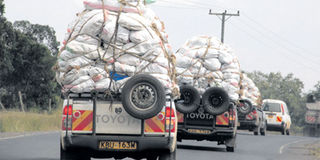Meru leaders, traders seek to reverse ban on miraa in UK

Miraa being ferried from Meru to Nairobi for sale. Leaders and trader say ban on the herb in the UK will cripple the economy of the region. Photo/FILE
Politicians and miraa traders are appealing to the government to initiate talks with United Kingdom to reverse directive ban sale of the stimulant.
Miraa, or Khat, is the main cash crop for the Meru and Embu counties.
On Wednesday, the UK government announced it would classify the herb as a Class C drug under the Misuse of Drugs Act 1971.
UK Secretary of State for the Home Department Ms Theresa May said the move means sale of miraa would be banned.
This is despite the advice given by Advisory Council on the Misuse of Drugs (ACMD) discounting the harm associated with use of the stimulant.
On Thursday, members of parliament proposed to establish an ad-hoc committee to investigate issues raised on Miraa and report to parliament within 90 days. Meru country women representative Florence Kajuju will chair the committee.
In the Senate, Meru Senator Kiraitu Murungi urged the president to initiate “diplomatic action” with a view to having the ban reversed. Mr Murungi said the ban was “political and discriminatory”.
“It is the duty of this government to protect the Miraa traders who have been involved in this business in the UK for a long time,” said Mr Murungi.
“The entire Miraa industry is under threat, it is about to collapse, the Meru economy is going to collapse,” said Mr Murungi.
Speaking in a phone interview to Nation, Nyambene Miraa Traders Association spokesman, Mr Kimanthi Munjuri urged the government to initiate talks with the UK government on behalf of the traders.
The country is currently exporting 60 tonnes per week to the UK which sells at Sh700 per Kilo. This translates to Sh42 million a week.
“If the UK market is closed, we do not have any other place to sell the product in Europe. This is our main source of income and we do not have an alternative source of revenue ,” said Mr Munjuri.
Miraa is imported into the UK from Kenya, Ethiopia and Yemen.
“Traditionally khat has been used as a medicine and was widely perceived to be a food, not a drug,” reads the ACMD report.
On January 5 the Netherlands outlawed the plant subsequently closing out a market priced at Sh1.6 billion annually.
The Royal Dutch Airlines (KLM) hence stopped airlifting miraa to Amsterdam, terming it a reaction to a circular from The Hague government to traders in Amsterdam airport warning against trade in the product.
“The whole of northern Europe and most recently the Netherlands, and the majority of other EU member states have controlled khat, as well as most of the G8 countries, including Canada and the USA.
“Failure to take decisive action and change the UK’s legislative position on khat would place the UK at a serious risk of becoming a single, regional hub for the illegal onward trafficking of khat to these countries,” reads the written statement to parliament.
The Home Secretary noted that “Khat continues to feature prominently amongst the health and social harms, such as low attainment and family breakdown, cited by affected communities and the police and local authorities working with them…. The decision to bring khat under control is finely balanced and takes into account the expert scientific advice and these broader concerns.”
Ms May said seizures of khat transiting the UK en route to the Netherlands have already been increasing in size and frequency since the Dutch ban earlier this year.




